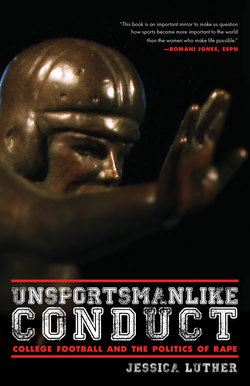Читать книгу Unsportsmanlike Conduct - Jessica Luther - Страница 6
На сайте Литреса книга снята с продажи.
ОглавлениеEditor’s Foreword
Rape is one of the most terrible crimes on earth and it happens every few minutes. The problem with groups who deal with rape is that they try to educate women about how to defend themselves. What really needs to be done is teaching men not to rape.
—Kurt Cobain
The world of sports has a sexual assault problem the same way one can say that Miami has a global warming problem. In other words, it’s true, but it’s also an issue that extends well beyond just this one corner of the planet. The sports world is not a hermetically sealed arena, cut off from the real world; it is here in this real world where we need to begin the discussion about understanding humanity’s entrenched culture of gender violence.
The world has a violence-against-women and sexual assault problem. According to the World Health Organization, 35 percent of all women globally are survivors of some form of violence. Then there is the United States. This country has a violence-against-women and sexual assault problem, with numbers just below the global average; the Justice Department estimates that 68 percent of rapes are not reported to law enforcement. Our college campuses have a sexual assault problem.These institutions of higher learning are places where one in five women say that they have faced sexual violence, with 80 percent of all cases not reported. We also know that the issue is handled terribly by too many universities. According to the Department of Education’s Office for Civil Rights, at least 183 colleges and universities are currently under federal investigation for mishandling sexual assault claims on their campuses.
We know as well that on many campuses, sports are at the heart of campus life and athletes are deified, entitled campus leaders who have a tremendous amount of influence on their communites. These heroes are more likely to commit and be charged with sexual assault. One study showed that college athletes make up 3.3 percent of male students but 19 percent of those accused of sexual assault. A 2012 Rutgers analysis found something similar and the Boston Globe put it, “It is unclear whether college athletes are more likely to commit sexual crimes than other students. But we see a unique sense of entitlement, sexual and otherwise, among some male college athletes, especially those in high-profile or revenue-producing sports.”
Or, as Jessica Luther wrote on social media, in a post that inspired us to approach her to write this trailblazing book, “The stories about campus administrations or athletic depts. failing to do a damn thing about sexual violence are endless . . . Yesterday I just told someone I couldn’t pursue one because I was already working on three other ones. I have that same conversation at least twice a week at this point.”
The point here is simple: we have a problem that without question exists independently of sports, yet we also have a lot of data that says it’s worse in sports. In recent years colleges like Missouri, Vanderbilt, Florida State, and Tennessee have seen such cases. These stories are chained together by the blaringly obvious yet little-discussed relationship between male jock culture and rape culture. Everyone who either cares about stopping the violence or about the lessons produced by sports has an obligation to educate themselves on the issue and speak out.
It is for all of these reasons that Unsportsmanlike Conduct was a book that needed to be written. Jock culture has morphed into rape culture on too many campuses, and we in the sports media have been silent about it for far too long. Right now, many of the institutions of higher learning discussed in these pages are attempting to grapple with this reality. Yet it often feels like so much flailing: trying to cover gaping wounds with bandages or shoveling sand into the ocean just to be able to say, Hey, we’re trying!
These cases tend to be viewed in isolation from one another: individual instances on different campuses. They are rarely examined systemically—as a symptom of a college sports landscape that exploits so-called student-athletes and then far too often excuses any and all behavior as a method of payment. Now that people are finally talking about this issue, we desperately need to expand this discussion, and Unsportsmanlike Conduct fills the gap. This was a book that needed to be written but could not have been written by anyone other than Jessica Luther, who we knew we could trust to tell this story the way it needed to be told. With a track record going back years, Luther has covered this story with a relentless consistency that no one on the sportswriting landscape can match. She also provides a framework that ensures the reader will not throw up her or his hands with despair or seek out easy scapegoats. This is in fact more than a book; it is a tool to help crack the code of why these assaults keep happening. This will help athletic departments—if they are willing to listen—to cease being examples of what is wrong with university life and help make them the leaders they need to be in the push to stop the violence.
—Dave Zirin, Editor, Edge of Sports Books
